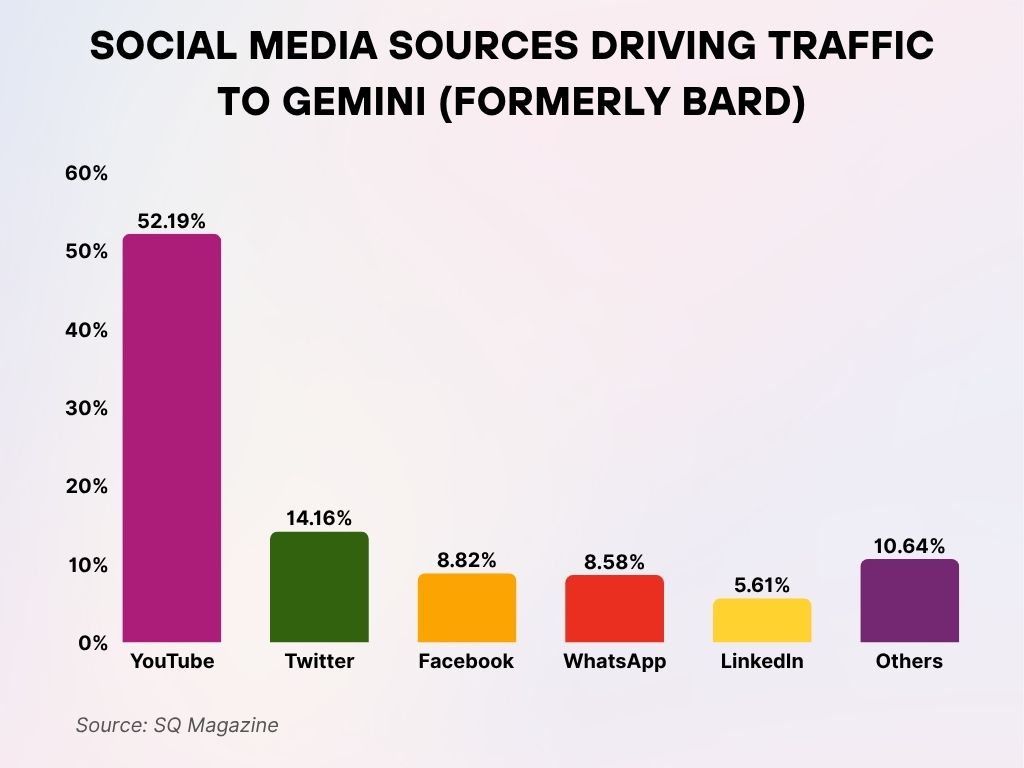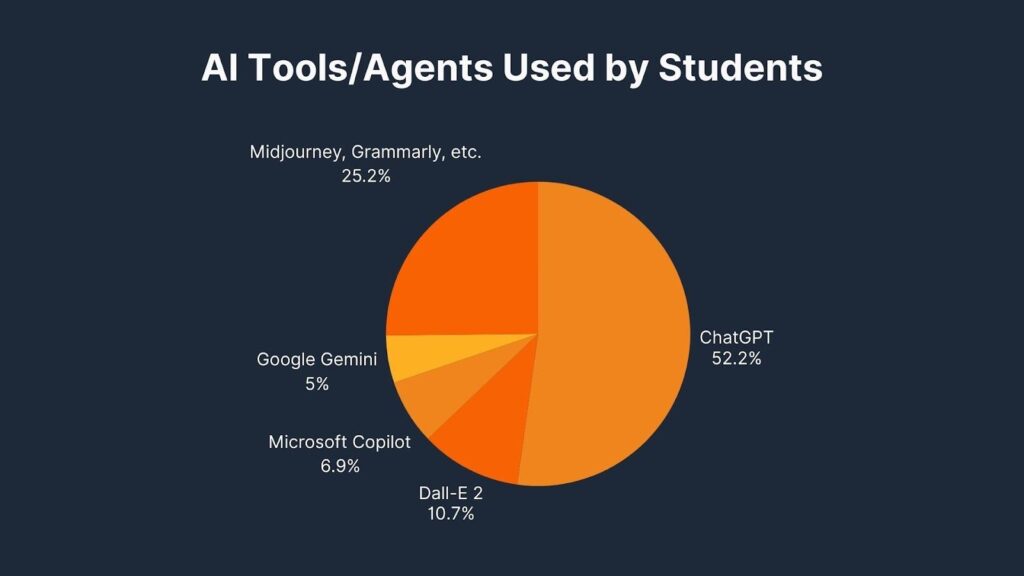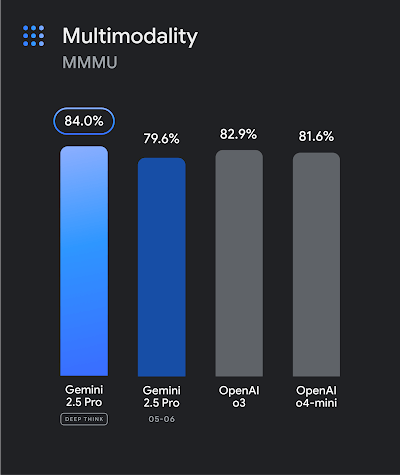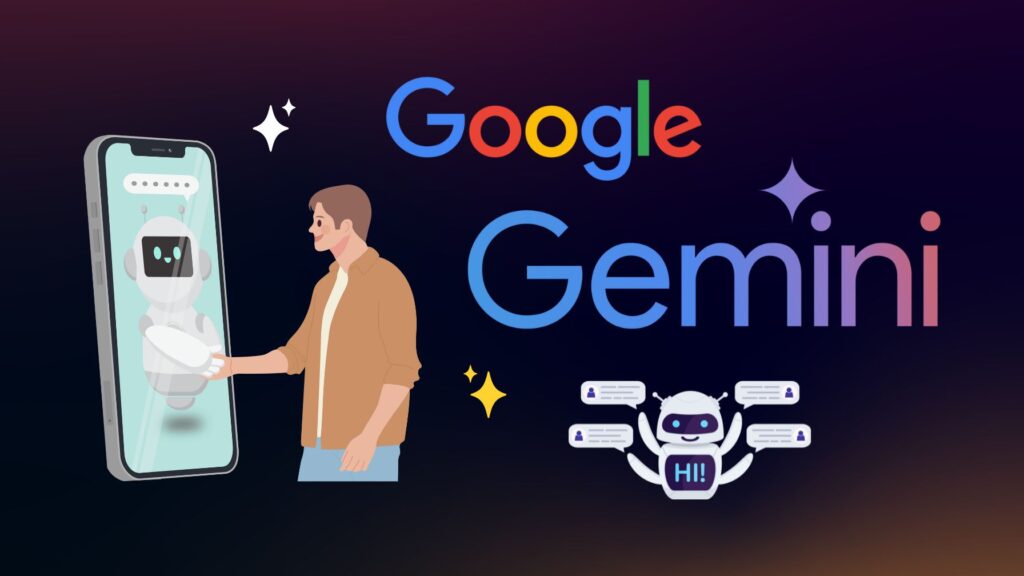When Google unveiled Gemini AI, the tech world paused. Not just because it was another artificial intelligence launch, but because it promised something more: a multi-modal future. It was December 2023 when Sundar Pichai described Gemini not merely as a chatbot or assistant but as an evolving platform built to understand and generate text, images, audio, and even code. Fast forward to 2025, Gemini has matured into a formidable force, weaving itself into daily workflows, enterprise systems, and developer ecosystems. The pace of adoption and innovation around Gemini is redefining what AI means for business, society, and everyday users.
This article digs into the numbers, trends that reflect where Gemini stands today and where it’s likely heading tomorrow.
Editor’s Choice
- 82 million active users are now interacting with Gemini monthly as of Q2 2025.
- Google Gemini powers 21% of all generative AI search interactions globally in 2025, overtaking Bing’s Chat in terms of daily usage volume.
- Google Workspace integrations with Gemini have driven over 2.3 billion document interactions in the first half of 2025.
- Gemini’s language model, Gemini 1.5 Ultra, has achieved an accuracy score of 93.4% in benchmark MMLU tests by June 2025.
- Over 46% of U.S. enterprises now deploy Gemini AI in their productivity workflows as of 2025, double from the year before.
- In 2025, Gemini handles 58% of voice-based customer service chats in Google Cloud, showing significant enterprise uptake.
- Google Play now lists 5,200+ third-party apps leveraging Gemini APIs for in-app AI features, as of July 2025.
Generative AI Chatbots by Market Share
- ChatGPT dominates the landscape with a massive 60.5% of the market share, making it the clear leader in generative AI chatbot usage.
- Microsoft Copilot holds the second-largest share at 14.3%, reflecting its strong integration with Office tools and enterprise systems.
- Google Gemini (formerly Bard) closely follows with a 13.5% share, showcasing Google’s competitive position in AI-powered search and productivity.
- Perplexity accounts for 6.2%, gaining traction as an emerging research-focused chatbot.
- Claude AI captures 3.2% of the market, known for its ethical design and user-first privacy model.
- Grok, developed by xAI, holds a modest 0.8% share, but signals growth in niche communities.
- Deepseek, a lesser-known platform, claims 0.5%, hinting at early adoption in specialized AI applications.
- Komo registers 0.4%, suggesting small but growing use cases.
- Brave Leo AI rounds out the chart with 0.2%, targeting privacy-conscious users via the Brave browser.

Global Adoption Rate of Google Gemini AI
- Gemini is now deployed in 182 countries, marking a global coverage of 93% of internet-connected regions by mid-2025.
- In Europe, Gemini holds a 29% market penetration among AI productivity tools, surpassing Microsoft Copilot in Germany and France.
- India and Brazil lead Gemini user growth in the Global South, contributing to 22% of new account activations in 2025.
- Gemini now supports automated translation in 130+ languages, helping it scale in regions with multilingual user bases.
- 14.5 million students globally now access Gemini via educational licenses under Google for Education in 2025.
- The Middle East has seen a 240% YoY increase in Gemini enterprise use, led by sectors in finance and logistics.
- In Africa, Gemini usage grew by 180% YoY, supported by local language model fine-tuning and mobile-first AI access.
User Growth Trends Since Launch
- Monthly active users of Gemini have grown from 7 million in Q4 2023 to 82 million in Q2 2025.
- Gemini has seen a 370% growth in user registrations from January 2024 to May 2025.
- The education sector now accounts for 18% of Gemini’s user base, showing a shift in early adoption patterns.
- Small businesses and solopreneurs make up 36% of active users in 2025, with widespread use in content generation.
- User engagement per session has increased by 45% in 2025, with average time-on-platform now at 11.4 minutes.
- Gen Z users represent 32% of new registrations as of Q2 2025, driven by integrations in mobile and creator tools.
- Gemini usage from mobile apps has grown 210% YoY, accounting for 61% of daily interactions.
Month-over-Month Traffic Change – GenAI Tools
- Gemini.google.com recorded the highest surge with a +28.9% traffic increase, reflecting rising user adoption.
- Perplexity.ai saw a solid boost of +12.14%, signaling growing interest in its AI search model.
- ChatGPT.com traffic grew by +6.82%, continuing its dominant presence in the GenAI space.
- Claude.ai experienced a modest rise of +4.24%, showing steady user growth.
- Deepeek.com traffic dropped by -9.15%, marking the biggest decline among the listed tools.
- Grok.com also faced a decline of -8.92%, suggesting a dip in monthly user visits.

Market Share Compared to Competing AI Platforms
- Gemini holds a 24% market share among global LLM-based AI tools in 2025.
- It has overtaken Claude by Anthropic in North America, with Gemini’s U.S. usage surpassing 37% of all generative AI tool sessions.
- Compared to OpenAI’s ChatGPT, Gemini leads in document-centric productivity use cases by 9 percentage points in 2025.
- In the Asia-Pacific region, Gemini now ranks #2, behind only ChatGPT, accounting for 21% of all AI queries.
- In mobile AI use cases, Gemini dominates with a 32% share, driven by Android-native integrations.
- Among enterprise AI deployments, Gemini is now preferred by 1 in 4 companies globally, per 2025 data.
- Gemini APIs have a 42% higher integration rate in apps built on Firebase or Google Cloud compared to non-Google platforms.
- In search augmentation, Gemini has captured 27% of assisted-query interactions in Google Search, versus 18% for Bing Copilot.
Enterprise vs. Consumer Usage
- As of 2025, 63% of Gemini’s total usage comes from enterprise users.
- 41% of Fortune 500 companies have embedded Gemini in at least one operational department.
- Consumer-level users dominate in content creation, accounting for 58% of Gemini-generated outputs like summaries and creative drafts.
- Healthcare and finance are the fastest-growing sectors for enterprise deployment, seeing 3.4x growth in adoption in 2025.
- Gemini Pro is used by 27 million enterprise users globally, as of June 2025.
- Individual users have grown to over 52 million, with heavy daily usage among solopreneurs and marketers.
- In internal corporate automation, Gemini integrations have reduced repetitive tasks by 38%, per Google Cloud client data.
- Enterprise chat analysis via Gemini has processed over 120 billion messages for automation and knowledge discovery.
- Freelancers using Gemini increased by 92% YoY, making it a staple for personal productivity in 2025.
- Among enterprise tools, Gemini for Google Workspace is the most popular integration, used in 73% of Gemini enterprise accounts.
Social Media Sources Driving Traffic to Gemini (formerly Bard)
- YouTube is the top traffic driver, accounting for a significant 52.19% of all social referrals to Gemini.
- Twitter contributes 14.16%, reflecting its role in trending tech discussions and link sharing.
- Facebook sends 8.82% of social traffic, showing steady engagement from its large user base.
- WhatsApp generates 8.58%, pointing to strong peer-to-peer content sharing.
- LinkedIn brings in 5.61%, likely from professional and educational interest in Gemini.
- Other sources collectively account for 10.64%, highlighting the influence of niche or alternative platforms.

Performance Benchmarks and Model Accuracy
- Gemini 1.5 Ultra achieved 93.4% on the MMLU benchmark, the highest among commercial models in 2025.
- In Big-Bench Hard (BBH) tasks, Gemini scored 87.9%, outperforming GPT-4 by 3.8 percentage points.
- Gemini’s code generation accuracy reached 81% on the HumanEval Python test.
- Latency for text completions is now 18% faster compared to Q4 2024, with an average response time of 0.68 seconds.
- Visual reasoning benchmarks place Gemini at 89.3%, making it a leader in multi-modal tasks.
- For audio transcription, Gemini outperformed Whisper with 98.6% accuracy on clean speech datasets.
- Error rate in medical QA tasks dropped to 5.4% in Gemini Ultra, compared to 9.2% in earlier versions.
- Gemini’s real-time translation accuracy is now 95% across the top 50 global languages.
- Its hallucination rate in zero-shot reasoning tasks fell below 2.7% in 2025, a new industry low.
- Gemini Lite’s mobile version retains 91% of core model performance while using 68% less compute power.
Top Use Cases Across Industries
- In education, Gemini supports 5.4 million classrooms with automated lesson generation and feedback tools.
- Marketing teams use Gemini for campaign content generation, with 42% of digital ads now involving Gemini-generated copy.
- The legal industry uses Gemini for document analysis in 21% of U.S. mid-size law firms.
- Customer support bots powered by Gemini now handle 2.1 billion tickets annually across sectors.
- 33% of e-commerce brands use Gemini for product description automation and chat personalization.
- In journalism, 1 in 3 newsrooms in the U.S. employ Gemini to assist with story research and summarization.
- Gemini powers medical intake and triage chatbots in over 7,000 hospitals worldwide as of 2025.
- In financial services, Gemini is used in risk analysis and fraud detection in 22% of firms globally.
- Real estate companies report 31% faster property data processing times using Gemini models.
- In HR and recruiting, Gemini is now used in 28% of AI-enhanced applicant tracking systems.
AI Tools Most Used by Students
- ChatGPT leads by a wide margin, with 52.2% of students using it for learning, writing, and research assistance.
- Midjourney, Grammarly, etc., collectively hold 25.2%, showing strong use of specialized or complementary AI tools.
- DALL·E 2 is used by 10.7% of students, highlighting growing interest in AI-powered image generation.
- Microsoft Copilot supports 6.9% of student users, particularly in productivity and coding tasks.
- Google Gemini is used by 5%, indicating early adoption but still behind other major tools.

Language Support and Multilingual Usage Rates
- Gemini supports 133 languages natively in 2025.
- Translation latency has dropped to under 1.2 seconds, enabling real-time use in multilingual meetings.
- Spanish, Hindi, and Arabic saw the highest usage outside English, making up 39% of total translations.
- Gemini’s support for indigenous languages expanded to include 26 regional dialects, including Quechua and Yoruba.
- AI-powered subtitles via Gemini are now embedded in 67% of Google Meet sessions worldwide.
- Multilingual document generation surged, with 380 million cross-language documents created in 2025.
- Gemini’s translation accuracy for legal documents exceeds 97%, outperforming previous generation tools.
- Usage in Africa grew due to improved Swahili and Hausa support, accounting for 14% of the continent’s AI interactions.
- Gemini supports language-switching mid-conversation in real-time, used in 28% of global support calls.
- Over 1.9 million multilingual chatbots now rely on Gemini APIs to serve diverse audiences.
Integration with Google Ecosystem Products
- Gemini is now integrated into 92% of Google Workspace accounts as of Q2 2025.
- Gmail’s Smart Compose suggestions, powered by Gemini, have increased typing speed by 34%.
- Over 1.4 billion Google Docs files were edited with Gemini-assisted rewriting in the first half of 2025.
- Gemini-powered search in Google Drive helps users retrieve files 43% faster on average.
- Google Meet uses Gemini to auto-summarize 78% of meetings in organizations with premium plans.
- Gemini suggestions now assist Android Studio developers in 23% of coding sessions.
- Google Maps now uses Gemini for dynamic query suggestions, improving voice search accuracy by 26%.
- YouTube Studio creators now use Gemini tools for title generation in 40% of uploads.
- Calendar scheduling with Gemini AI is now used by 52% of Workspace users with executive roles.
- Gemini automation flows in Google Sheets have reduced manual entry by 36% in business accounts.
Age Demographics of Website Visitors
- The 25 to 34-year age group makes up the largest portion of visitors at 31.22%, indicating strong engagement from young professionals.
- 18 to 24-year-olds follow closely with 23.29%, reflecting high interest from Gen Z users.
- 35 to 44-year-olds account for 19.12%, showing consistent participation from mid-career individuals.
- 45 to 54-year-olds contribute 13.19% of traffic, maintaining a solid presence.
- 55 to 64-year-olds represent 8.29%, suggesting lower but notable usage among older adults.
- Visitors over 65 years make up 5.21%, indicating emerging engagement from senior users.

Mobile vs. Desktop Usage Breakdown
- In 2025, 61% of Gemini usage originates from mobile devices.
- Android-native Gemini interactions outpace iOS by 3.5x, reflecting tighter integration with Google apps.
- On desktop, Chrome browser users account for 82% of total Gemini interactions.
- Gemini Mini for mobile delivers core AI features with 42% lower data usage, making it ideal for 4G zones.
- Usage during commuting hours (7–9 AM and 5–7 PM) rose by 58%, with mobile being the dominant platform.
- Desktop sessions average 14.2 minutes, while mobile sessions average 9.6 minutes, but with higher frequency.
- Tablet usage accounts for 7% of interactions, especially in the education and design sectors.
- Gemini mobile users trigger voice-based interactions 2.3x more often than desktop users.
- Touch-optimized tools like voice summarization and gesture controls saw 74% more engagement in mobile-only environments.
- Gemini for Android has been preinstalled on over 600 million devices globally by mid-2025.
Developer Adoption and API Usage
- Gemini APIs are now used by 420,000+ developers worldwide as of 2025, with a 61% YoY increase.
- The Gemini SDK has been cloned 2.9 million times from GitHub repositories.
- API requests average 310 million per day, with top use cases including chatbots, recommendation engines, and automation flows.
- Developers report an average 27% reduction in development time using Gemini’s code generation features.
- 68% of Gemini API users come from small to mid-sized startups and SaaS platforms.
- JavaScript, Python, and Kotlin are the top 3 languages used in Gemini-integrated apps.
- Open-source projects integrating Gemini have grown by 80% YoY, especially in education and accessibility tools.
- Gemini Cloud Functions are now natively supported in Google Cloud Run, with 99.98% uptime SLAs.
- Gemini API pricing tier updates in Q2 2025 brought a 22% reduction in cost for high-volume usage.
- Developer forums for Gemini now have 1.3 million active contributors globally.
Multimodality Performance (MMMU Benchmark)
- Gemini 2.5 Pro (Deep Think) leads with an impressive 84.0% score, showcasing its top-tier multimodal capabilities.
- The standard Gemini 2.5 Pro (05-06) version scores 79.6%, still maintaining strong performance.
- OpenAI GPT-4 (o3) follows closely with 82.9%, demonstrating high-level reasoning across modalities.
- OpenAI GPT-4-mini (o4-mini) performs well with 81.6%, suggesting efficiency with minimal drop in capability.

AI Safety, Ethical Metrics, and Transparency
- Gemini models now include bias detection layers that reduce demographic disparity in outputs by 46%.
- All Gemini versions in 2025 include source citation transparency in over 80% of factual completions.
- Google’s Responsible AI framework includes yearly audits, with Gemini passing 100% compliance checks this cycle.
- Toxicity scores across Gemini Ultra responses dropped by 57% since late 2024, per internal audits.
- Gemini’s child safety filter successfully blocked 98.9% of inappropriate prompts in educational deployments.
- Over 38% of AI model updates in 2025 were related to ethics, fairness, or user trust parameters.
- Public transparency reports on Gemini model behavior are now published quarterly, up from annually.
- Gemini aligns with ISO/IEC 23894 standards for AI risk management adopted in April 2025.
- Google’s internal ethics board now includes external AI experts from 12 countries, improving global perspective.
- User opt-out of data usage is honored in 98.6% of cases, per Google’s Privacy Accountability Index.
Recent Developments
- In May 2025, Google launched Gemini 1.5 Ultra, its most advanced multimodal model to date.
- Gemini for Education (G4E) introduced adaptive learning pathways for K–12 students, already been adopted in 6 states.
- Google partnered with Adobe, allowing Gemini to integrate directly with Photoshop’s new “AI Layers” tool.
- Gemini now powers Search Generative Experience (SGE) features in 18 languages worldwide.
- In Q2 2025, Gemini rolled out context-persistent memory, retaining user preferences across sessions.
- Gemini-enabled project automation tools launched in Google Sheets, triggering 8 million workflows in beta.
- A new safety sandbox lets enterprises test Gemini behaviors under controlled environments, used by 1,200+ companies.
- The Gemini Code Companion, a VS Code extension, saw 510,000 downloads in its first two months.
- Google’s “Gemini for Nonprofits” initiative now supports 13,000+ nonprofits with AI-powered grant writing and campaign tools.
- Custom GPT migration tools were released in 2025, allowing seamless transition from OpenAI’s APIs to Gemini APIs.
Conclusion
Google Gemini AI has rapidly evolved from a late 2023 debut into a major force across sectors in 2025. With a growing footprint across enterprise, education, developer ecosystems, and multilingual applications, Gemini is reshaping expectations for AI performance and safety. Its seamless integration within the Google ecosystem, commitment to transparency, and robust adoption statistics reflect a platform poised to remain central to AI innovation for years to come. For businesses, creators, educators, and developers alike, Gemini isn’t just another tool; it’s becoming infrastructure.


































































